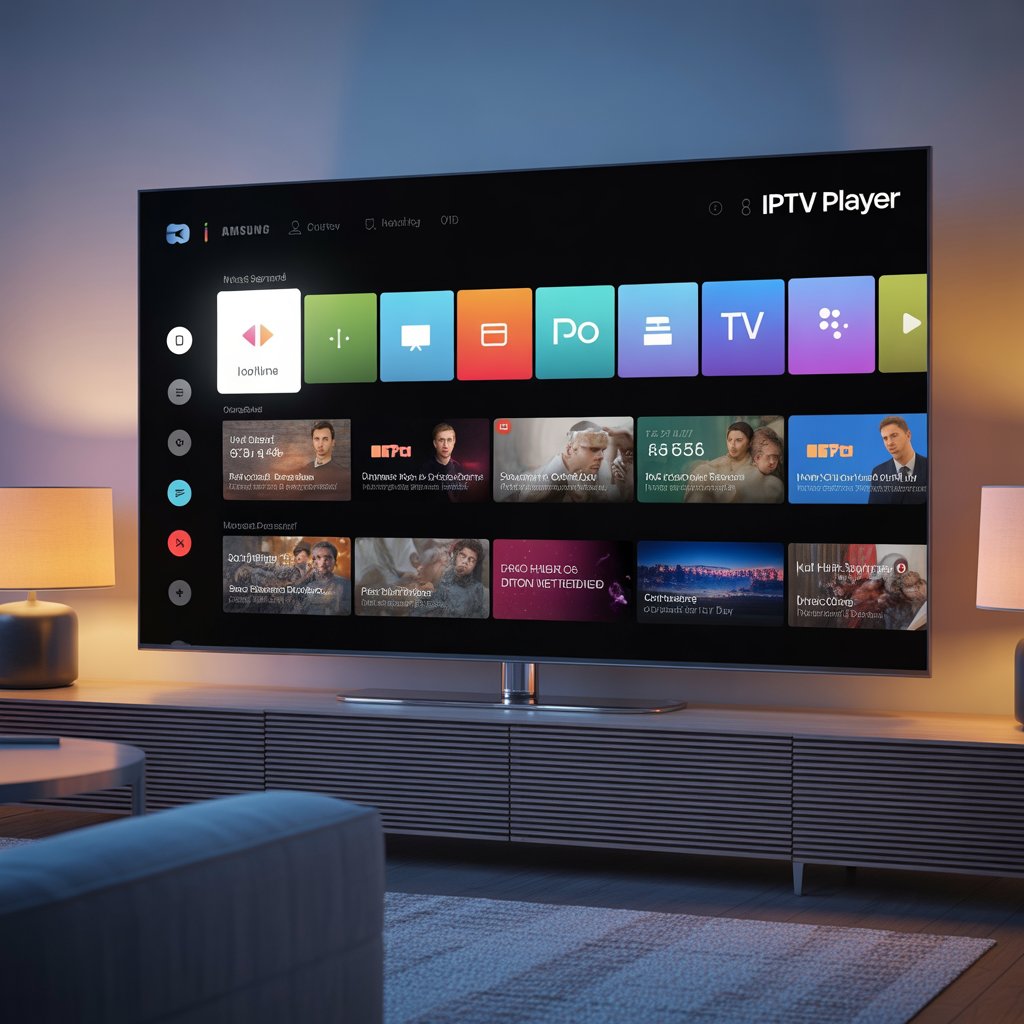IPTV for Samsung smart tv streaming

IPTV for Samsung Smart TV — Complete Setup, Best Apps & Tips
Introduction — What is IPTV for Samsung Smart TV?
If you want to stream live channels, sports, and on-demand content without a set-top box, iptv for Samsung Smart TV is the option that turns your TV into a powerful internet-powered media center. This guide walks you through everything: the apps that work best, how to install and configure them, performance tips, legal considerations, and troubleshooting.
Whether you are setting up iptv for Samsung Smart TV for the first time or tuning an existing setup for better reliability, this professional guide keeps instructions short, practical, and easy to follow.
Why use IPTV on a Samsung Smart TV?
There are several clear reasons users choose iptv for Samsung Smart TV over traditional cable or satellite:
- Access a wide variety of live channels, international networks, and on-demand libraries.
- Flexible packages — pay for what you want instead of bundled channels you don’t watch.
- Streaming updates and features (catch-up, multi-screen) are added faster than legacy services.
- Smart TV integration: control with your remote, use EPGs, and organize channel lists.
Note: always verify the licensing status of any IPTV service before subscribing.
Requirements — What you’ll need
To run iptv for Samsung Smart TV smoothly, prepare the following:
- A Samsung Smart TV (models 2015 onward commonly work; Tizen OS is typical).
- A stable Internet connection — wired Ethernet recommended for reliability.
- An IPTV app or client compatible with your TV (Smart IPTV, SmartOne IPTV, etc.).
- An IPTV playlist (M3U/M3U8) or service credentials provided by your IPTV provider.
- Optional: a USB drive for sideloading apps on older TV models.
Step-by-step: Installing IPTV apps on a Samsung Smart TV
The path to using iptv for Samsung Smart TV depends on your TV model and which app you choose. Below is a general workflow for the most common scenarios.
1. Install from Samsung Apps (recommended)
- Open the Samsung Smart Hub / Apps store on your TV.
- Search for a trusted IPTV client (for example, Smart IPTV or EZ Smart Player).
- Install the app and launch it.
- Enter the M3U URL or your provider credentials when prompted.
This is the cleanest installation method and keeps updates managed through Samsung’s App Store.
2. Sideloading (older TVs)
If an app isn’t available in the store for your model, you can often sideload it via USB. Steps vary by model year; common actions include copying a widget or package to a FAT32 USB drive and inserting it in the TV to trigger an install. Use caution and follow steps for your precise model.
3. Using an external streaming device
If your Samsung Smart TV is very old or can’t run your preferred IPTV app, an external device (Android TV box, Amazon Fire TV, Apple TV, or a small media PC) can host your IPTV client while outputting video to the Samsung display.
Best IPTV apps & clients for Samsung Smart TV
Popular apps that commonly support iptv for Samsung Smart TV include:
- Smart IPTV — widely used, supports M3U playlists and EPGs.
- SmartOne IPTV — alternative with playlist support for many Samsung models.
- EZ Smart Player — available on certain Samsung App stores.
Choose apps with good reviews, active updates, and clear setup guides. Where possible, prefer apps that well support EPG (electronic program guide), buffering controls, and playlist management.
How IPTV streams work on Samsung TVs — quick tech overview
When you configure iptv for Samsung Smart TV, the app fetches a playlist (usually M3U), then uses HTTP or HLS (M3U8) streaming to request channel streams from the provider. The TV decodes the stream and renders video. Because streaming uses your internet connection, network stability and bandwidth directly affect playback quality.
Many providers also offer an API (Xtream Codes or similar) that simplifies authentication and channel navigation inside the IPTV app.
Optimizing performance — tips that make a real difference
To get the best experience from iptv for Samsung Smart TV, apply these practical optimizations:
- Prefer Ethernet: Use a wired connection to reduce packet loss and buffering.
- Router placement: If you must use Wi-Fi, put your router near the TV or use mesh extenders.
- Adjust buffer size: Many IPTV apps allow buffer tuning to smooth intermittent networks.
- Limit concurrent streams: Heavy household internet usage can degrade IPTV playback.
- Keep firmware updated: Update TV OS and app versions for reliability and security.
Troubleshooting: Common problems and fixes
Black screen or “no signal”
- Verify the playlist URL is correct and your provider account is active.
- Check the TV’s internet connection — run a network test in Settings.
- Reboot the app, or uninstall and reinstall if it persists.
Persistent buffering
- Switch to wired Ethernet if possible.
- Reduce stream resolution (choose SD instead of HD) if bandwidth is limited.
- Increase the app buffer size or close other devices hogging bandwidth.
Missing EPG or wrong times
- Confirm the provider includes EPG data and your TV/app timezone is correct.
- Manually refresh the guide inside the IPTV app if supported.
Legal & ethical considerations
Using iptv for Samsung Smart TV can be entirely lawful — but it depends on the provider. Licensed IPTV services clearly describe their rights and channels. Unlicensed or “too good to be true” free services often carry copyright risks and unstable streams.
Best practices:
- Prefer reputable, licensed services with transparent terms.
- Read local law on streaming and copyright in your country.
- Avoid sharing subscription credentials publicly or using unknown playlists from forums.
Organizing channels and playlists
Well-organized playlists make your iptv for Samsung Smart TV setup much easier to use. Tips include:
- Group channels into categories (News, Sports, Movies, Kids).
- Use EPG-enabled playlists where possible for program details.
- Remove broken links to speed up channel lists and reduce buffering.
- Backup your custom M3U file in cloud storage or on USB for quick recovery.
Advanced features to look for
When comparing services for iptv for Samsung Smart TV, check for these advanced features:
- Catch-up and on-demand content
- Multiple concurrent streams
- Cloud DVR or recording options
- High-quality streams (HD/4K where available)
- Robust EPG and multi-language subtitles
When to use an external streaming device
If your Samsung TV model cannot run your chosen IPTV app smoothly, an external device (Android TV box, Fire TV, etc.) is a practical alternative. It offers:
- Broader app availability and frequent updates
- Better hardware for decoding high-bitrate streams
- More flexible sideloading and troubleshooting options
Checklist: Quick setup summary
- Confirm TV model compatibility with your chosen IPTV app.
- Secure a stable internet connection (target 10–25 Mbps per HD stream).
- Install IPTV app from Samsung Apps or sideload carefully.
- Load your provider’s M3U URL or credentials and test channels.
- Adjust buffer, EPG, and channel groups for the best experience.
FAQs — fast answers
Can any Samsung Smart TV use IPTV?
Most modern Samsung Smart TVs (Tizen OS, 2015+) support IPTV apps. Some older models may require sideloading or an external device.
What playlist formats are used?
M3U and M3U8 are the most common. Some providers also use APIs such as Xtream Codes for easier authentication.
Is IPTV cheaper than cable?
It can be, but pricing varies. Legal, licensed IPTV services often charge competitive monthly fees; unlicensed services may be cheaper but riskier.
Useful placeholders for further reading
Internal resources: [Link to related article on streaming setups], [Link to related article on optimizing home Wi-Fi].
External resources: [Link to an official IPTV client guide], [Link to official Samsung support page].
Final thoughts
Setting up iptv for Samsung Smart TV is straightforward with the right app and a stable internet connection. Focus on reputable services, keep your TV and apps updated, and organize playlists for a smooth experience.
